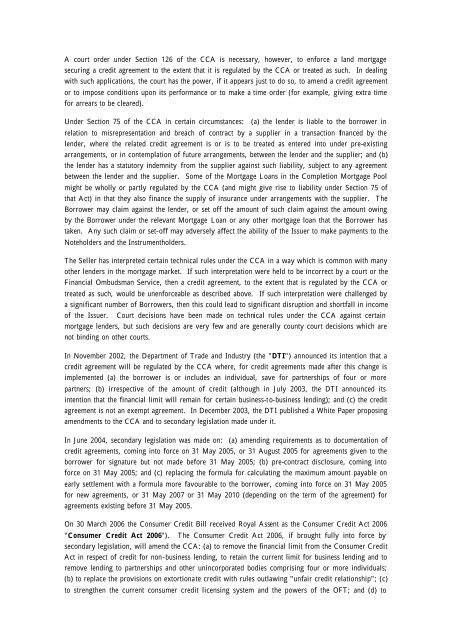ALBA 2007 â 1 plc - Irish Stock Exchange
ALBA 2007 â 1 plc - Irish Stock Exchange
ALBA 2007 â 1 plc - Irish Stock Exchange
You also want an ePaper? Increase the reach of your titles
YUMPU automatically turns print PDFs into web optimized ePapers that Google loves.
A court order under Section 126 of the CCA is necessary, however, to enforce a land mortgage<br />
securing a credit agreement to the extent that it is regulated by the CCA or treated as such. In dealing<br />
with such applications, the court has the power, if it appears just to do so, to amend a credit agreement<br />
or to impose conditions upon its performance or to make a time order (for example, giving extra time<br />
for arrears to be cleared).<br />
Under Section 75 of the CCA in certain circumstances: (a) the lender is liable to the borrower in<br />
relation to misrepresentation and breach of contract by a supplier in a transaction financed by the<br />
lender, where the related credit agreement is or is to be treated as entered into under pre-existing<br />
arrangements, or in contemplation of future arrangements, between the lender and the supplier; and (b)<br />
the lender has a statutory indemnity from the supplier against such liability, subject to any agreement<br />
between the lender and the supplier. Some of the Mortgage Loans in the Completion Mortgage Pool<br />
might be wholly or partly regulated by the CCA (and might give rise to liability under Section 75 of<br />
that Act) in that they also finance the supply of insurance under arrangements with the supplier. The<br />
Borrower may claim against the lender, or set off the amount of such claim against the amount owing<br />
by the Borrower under the relevant Mortgage Loan or any other mortgage loan that the Borrower has<br />
taken. Any such claim or set-off may adversely affect the ability of the Issuer to make payments to the<br />
Noteholders and the Instrumentholders.<br />
The Seller has interpreted certain technical rules under the CCA in a way which is common with many<br />
other lenders in the mortgage market. If such interpretation were held to be incorrect by a court or the<br />
Financial Ombudsman Service, then a credit agreement, to the extent that is regulated by the CCA or<br />
treated as such, would be unenforceable as described above. If such interpretation were challenged by<br />
a significant number of Borrowers, then this could lead to significant disruption and shortfall in income<br />
of the Issuer. Court decisions have been made on technical rules under the CCA against certain<br />
mortgage lenders, but such decisions are very few and are generally county court decisions which are<br />
not binding on other courts.<br />
In November 2002, the Department of Trade and Industry (the "DTI") announced its intention that a<br />
credit agreement will be regulated by the CCA where, for credit agreements made after this change is<br />
implemented (a) the borrower is or includes an individual, save for partnerships of four or more<br />
partners; (b) irrespective of the amount of credit (although in July 2003, the DTI announced its<br />
intention that the financial limit will remain for certain business-to-business lending); and (c) the credit<br />
agreement is not an exempt agreement. In December 2003, the DTI published a White Paper proposing<br />
amendments to the CCA and to secondary legislation made under it.<br />
In June 2004, secondary legislation was made on: (a) amending requirements as to documentation of<br />
credit agreements, coming into force on 31 May 2005, or 31 August 2005 for agreements given to the<br />
borrower for signature but not made before 31 May 2005; (b) pre-contract disclosure, coming into<br />
force on 31 May 2005; and (c) replacing the formula for calculating the maximum amount payable on<br />
early settlement with a formula more favourable to the borrower, coming into force on 31 May 2005<br />
for new agreements, or 31 May <strong>2007</strong> or 31 May 2010 (depending on the term of the agreement) for<br />
agreements existing before 31 May 2005.<br />
On 30 March 2006 the Consumer Credit Bill received Royal Assent as the Consumer Credit Act 2006<br />
"Consumer Credit Act 2006"). The Consumer Credit Act 2006, if brought fully into force by<br />
secondary legislation, will amend the CCA: (a) to remove the financial limit from the Consumer Credit<br />
Act in respect of credit for non-business lending, to retain the current limit for business lending and to<br />
remove lending to partnerships and other unincorporated bodies comprising four or more individuals;<br />
(b) to replace the provisions on extortionate credit with rules outlawing "unfair credit relationship"; (c)<br />
to strengthen the current consumer credit licensing system and the powers of the OFT; and (d) to

















